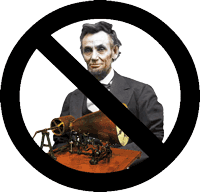The "Lost" Tracing of Lincoln's Voice

Did Édouard-Léon Scott de Martinville record Abraham Lincoln's voice on a phonautograph in the White House in 1863? We often get asked about this persistent rumor. The answer: we have seen no solid evidence that such a recording session ever took place, and we can trace the rumor itself back only a few decades.
In Antique Collecting for Men (1969), Louis Hertz writes about "two legends that continually pass among succeeding groups of collectors, evidently possessing a curious attraction for the minds of such enthusiasts." One of these involves photography, but the other "relates to the supposed premature invention of the phonograph by a Frenchman who visited the White House with his machine during the Civil War and actually made recordings of the voice of Abraham Lincoln. His recording material, however, supposedly was so impermanent that a record could be played back but once and was then useless. Furthermore, supposedly his last record remained unplayed for some years until at last Edison ruined it in a bungled attempt to play it into one of his early machines so that it could permanently be preserved. The origin of this story apparently comes from garbled accounts of the Phonautograph, a device invented in 1857 by Leon Scott, that would make a graph of the human voice but not a playable recording" (pp. 269-70).
Thirty years later, the New York Times interviewed prominent collector and researcher Allen Koenigsberg, who was familiar with Hertz's account, as quoted above. The article opens with a version of the story that departs markedly from Hertz's. It is now Scott himself who is alleged to have made the recording, which was not destroyed by Edison but has instead "never been found," turning it into a holy grail—the "lost tracing of Lincoln's voice."
This legend resurfaces in Brad Smith's novel Busted Flush (2005), which credits Koenigsberg with technical guidance. Smith's protagonist discovers a phonautograph with an intact recording in a sealed room among other Lincoln artifacts. A neighbor later tells him: "Leon Scott visited the United States in 1863, and it's been well documented that he paid Lincoln a visit in Washington while he was here. There's been a persistent rumor floating around ever since that he recorded old Abe on a phonautograph and that the cylinder still exists somewhere. One theory has it stashed away somewhere in the White House archives" (p. 200). In fact, Smith's characters conclude they have something different: a live recording of Lincoln delivering his Gettysburg Address, made by a local inventor-tinkerer. But meanwhile the story of Scott's visit to Lincoln has advanced from speculation to "well documented" fact.
So it is that a 1960s fable about lost opportunity has become a persistent legend about lost treasure. If anyone can trace the story back before 1969, we'd like very much to hear about it. But we can also challenge the rumor from another direction. Scott's private autobiography, still in the possession of his descendants, spells out his activities for the 1860s in considerable detail. There's no mention in it of a visit to the United States.
For more visual recordings and good stories from this author, see Patrick Feaster's Grammy-nominated Pictures of Sound.
